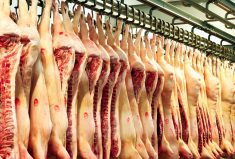Canada will be able to take only about a third of the revenge it asked the World Trade Organization to authorize over the United States’ country-of-origin labelling (COOL) law.
An arbitration panel of the WTO’s Dispute Settlement Body (DSB) ruled Monday that Canada and Mexico may now ask the DSB to authorize annual retaliatory tariffs, worth C$1.055 billion and US$227.76 million respectively, against specified U.S. goods.
The DSB’s arbitrators ruled those amounts to equal the “annual level of nullification or impairment of benefits accruing” to Canada and Mexico as a result of the COOL measure’s impacts on Canadian and Mexican livestock and meat exports to the U.S.
Read Also

U.S. grains: Wheat futures rise on supply snags in top-exporter Russia
U.S. wheat futures closed higher on Thursday on concerns over the limited availability of supplies for export in Russia, analysts said.
The amount comes in well below the C$3.068 billion and US$653 million Canada and Mexico had originally sought in annual retaliation — amounts the U.S. government disputed at an arbitration panel hearing in September.
The U.S. government had challenged Canada’s and Mexico’s inclusion of “domestic price suppression” in the two countries’ calculations of COOL-related losses.
The panel disagreed with Canada’s and Mexico’s suggestions that “nullification or impairment of benefits” refer to “any adverse effects resulting from the violation of the national treatment obligations at issue.”
“As we see it, the right in question is for imported products not to receive less favourable treatment than domestic products; the extent to which the advantage flowing from the right has been diminished is a separate question from what that right is,” the panel wrote Monday.
Furthermore, the panel said, the WTO’s Subsidies and Countervailing Measures (SCM) Agreement “explicitly distinguishes such domestic price suppression effects from nullification or impairment” laid out in the 1994 General Agreement on Tariffs and Trade (GATT) on which the WTO rules are based.
Also, the panel wrote, while it’s “readily conceivable” that trade losses from a violation such as COOL would have corresponding domestic market impacts, that doesn’t not mean all such losses could or should be rebalanced via suspension of trade concessions.
Besides, the panel said, allowing those losses when determining the “net loss” suffered in the domestic market would raise a whole other question: How would one account for suppressed prices’ benefits to “downstream consumers” in the domestic market?
“No compromise”
All that said, Canada’s livestock and meat sector groups said Monday they welcome the arbitation panel’s ruling “with great satisfaction.”
“Our patience is exhausted,” the groups, including the Canadian Cattlemen’s Association, Canadian Pork Council, National Cattle Feeders’ Association and Canadian Meat Council, said in a joint statement Monday. “There is no further negotiation to be done and no compromise is acceptable.”
Canada’s producers and processors, they said, “expect the U.S. to do nothing less than repeal COOL or face the immediate imposition of retaliatory tariffs on U.S. goods to the same extent as the damage we have endured.”
Federal Agriculture Minister Lawrence MacAulay and Trade Minister Chrystia Freeland, in a separate statement Monday, said if the U.S. Senate doesn’t take “immediate action” to repeal COOL for beef and pork, following the lead of the U.S. House of Representatives in June, Canada “will quickly take steps to retaliate.”
In the meantime, they said, Canada “continues to work with our partners in the U.S., and in the U.S. Senate, to urge the full repeal of the discriminatory COOL policy for beef and pork.”
The U.S. National Grain and Feed Association (NGFA) on Monday reiterated its call for a “full repeal” of COOL in the U.S. Congress, as the “most direct, certain and expeditious way to prevent the adverse economic impact that imposition of Canadian and Mexican sanctions would have on other segments of the U.S. economy, including many grain- and animal-based products.”
The Washington-based NGFA on Monday noted its support of the bill passed in the House of Representatives in June, and of “identical” legislation now being sought by Sen. Pat Roberts, chair of the U.S. Senate’s agriculture committee.
“It is important that the U.S. adhere to its WTO obligations and set an example for the rest of the world, particularly as it pursues significant new trade accords under the Trans-Pacific Partnership and other initiatives,” NGFA president Randy Gordon said.
“A full repeal of COOL is the only policy option available that unquestionably would prevent imposition of sanctions and the economic damage that would result.”
At a U.S. Senate ag committee hearing on COOL retaliation in June, Roberts, a Kansas Republican, warned that “I must emphasize to my colleagues and all of agriculture that retaliation is fast approaching and the responsibility sits squarely on our shoulders to avoid it.”
Targets
Passed by the U.S. government in 2008 and implemented in 2009, mandatory COOL requires country-of-origin labelling for beef, pork, lamb, chicken and goat meat, and certain perishable commodities sold at retail outlets in the U.S.
Since then, the Canadian livestock and meat groups said Monday, cumulative losses for Canada’s beef and pork sectors have been “staggering” as U.S. buyers discount the Canadian product to recover the cost of segregating imports, or reject the Canadian product entirely.
In every challenge Canada and Mexico has since mounted at the WTO, the international trade body’s dispute panels and appeal panels have “repeatedly found that the U.S. is in breach of its WTO obligations,” the Canadian groups said.
The only revision the U.S. made, after losing at the WTO Apellate Body in 2013, “increased the negative impact on Canadian farmers and meat processors,” by requiring even more specific information on the labels, they noted.
Canada’s shortlist of proposed retaliatory tariffs, drafted by the previous Conservative government, targets U.S. live cattle and hogs and fresh and frozen beef and pork products.
It also calls for tariffs on U.S. cereal, bread, pasta, frozen potatoes, frozen orange juice, wine, cheese, cocoa, apples, cherries, fowl, maple syrup, ketchup, sugars, glucose and fructose and some other food- and non-food-related wares.
The products on Canada’s retaliation list target the constituents of U.S. legislators who support mandatory COOL, Saskatchewan Agriculture Minister Lyle Stewart noted in a separate release Monday.
“We are confident that these retaliatory tariffs will demonstrate to the U.S. that Canada is not backing down when it comes to discriminatory COOL requirements,” he said. “COOL benefits neither U.S. producers nor consumers and it costs the Canadian and U.S. economies billions of dollars every year. It needs to be immediately repealed.” — AGCanada.com Network




















